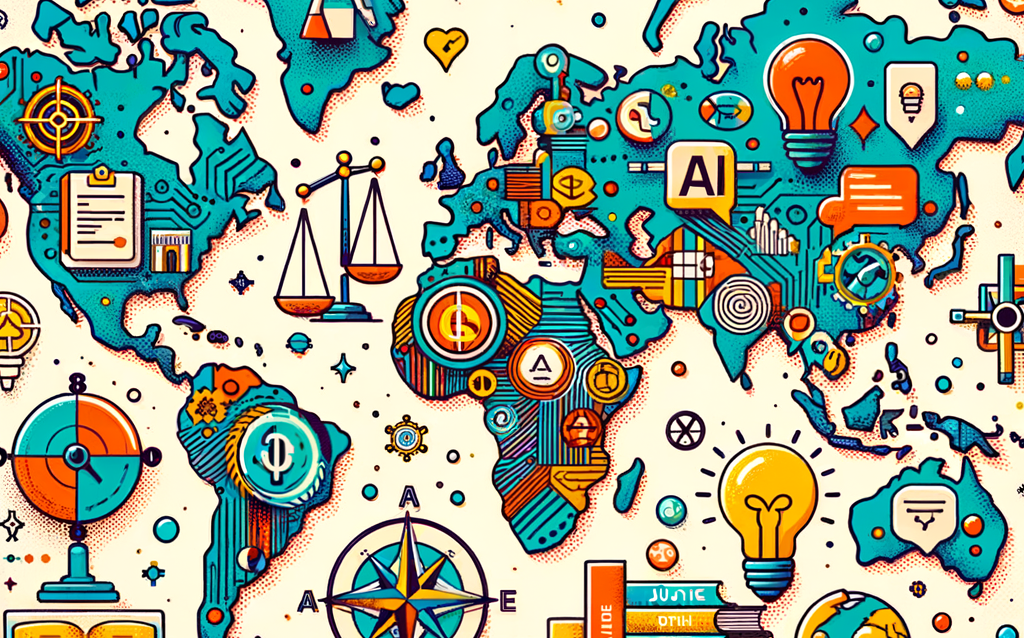In a world where Artificial Intelligence (AI) is rapidly evolving, the ethical considerations surrounding its use are coming to the forefront of international dialogue. As AI becomes more integrated into everyday life, countries across the globe are grappling with how to develop and implement ethical guidelines that balance innovation with societal well-being. This article explores the fascinating landscape of AI ethics, showcasing how various nations approach this complex issue and highlighting the importance of global cooperation.
Global Harmony: Bridging AI Ethics Across Nations
The development of AI ethics is not confined to a single nation; it is a collective endeavor that transcends borders. Countries around the world are recognizing the need for international collaboration to establish common ethical standards for AI technologies. The European Union, for instance, has been a pioneer in this area, proposing comprehensive regulations that emphasize transparency, accountability, and human rights. These efforts aim to create a unified framework that can serve as a benchmark for other nations, fostering global harmony in the realm of AI ethics.
Similarly, the United Nations (UN) is playing a pivotal role in bridging AI ethics across nations through initiatives like the Global AI Ethics Forum. This platform brings together experts, policymakers, and industry leaders from various countries to discuss and develop ethical guidelines for AI. The goal is to create a shared understanding and address common challenges, such as data privacy, bias, and the impact of AI on employment. By promoting dialogue and cooperation, the UN hopes to ensure that AI technologies are developed and deployed responsibly, benefiting humanity as a whole.
However, achieving global harmony in AI ethics is not without its challenges. Different countries have unique cultural, social, and political contexts that influence their approach to AI ethics. While some nations may prioritize individual privacy and data protection, others might focus on economic growth and innovation. Striking a balance between these diverse perspectives requires ongoing negotiation and compromise, but the shared goal of ethical AI provides a strong foundation for collaboration.
Diverse Minds, United Goals: AI Ethics Around the World
AI ethics is a mosaic of diverse perspectives, with each country bringing its unique values and priorities to the table. In Japan, for example, the concept of “Society 5.0” envisions a future where AI and robotics are seamlessly integrated into society to enhance quality of life. The Japanese approach to AI ethics emphasizes harmony between humans and machines, reflecting the cultural importance of social cohesion and collective well-being. This vision is supported by ethical guidelines that prioritize safety, inclusivity, and respect for human dignity.
Across the Atlantic, the United States adopts a somewhat different approach, focusing on the balance between innovation and regulation. American tech giants like Google and Microsoft are leading the charge in developing AI ethical principles, advocating for transparency, fairness, and accountability. At the same time, U.S. policymakers are working to create a regulatory framework that encourages technological advancement while addressing ethical concerns. This dynamic interplay between industry and government highlights the nation’s commitment to fostering responsible AI development.
Meanwhile, in countries like India and Brazil, AI ethics is being shaped by the need to address social and economic disparities. These nations are leveraging AI to tackle pressing issues such as poverty, healthcare, and education, with a strong emphasis on fairness and accessibility. Ethical considerations in these contexts often focus on ensuring that AI technologies benefit all segments of society, particularly marginalized communities. By integrating ethical principles into their AI strategies, these countries are working towards inclusive and equitable technological progress.
As we navigate the complex terrain of AI ethics, it becomes clear that no single nation can tackle these challenges alone. The diverse approaches of different countries highlight the importance of global cooperation and dialogue in developing ethical guidelines that resonate with varied cultural and societal contexts. By learning from each other and embracing our shared goals, we can create a future where AI technologies are harnessed for the greater good, transcending borders and benefiting humanity as a whole. The journey towards ethical AI is a collective one, and together, we can build a world where technology and ethics coexist harmoniously.







